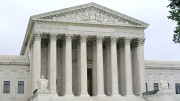By: Mike Givens*/TRT Assistant Editor—
United States Supreme Court Justice Antonin Scalia’s death is poised to shake up the political arena in the coming months and stir up both liberal and conservative rivalries in what is already shaping up to be a tumultuous election year. Supreme Court justices are appointed for life, and with the high court’s 5-4 conservative majority prior to Scalia’s death, President Obama is primed to nominate a successor that could tip the balance in favor of a more progressive panel of judges.
My reaction to Scalia’s death was similar to the one I had for Westboro Baptist Church founder Fred Phelps in March of 2014: I’m deeply sorry for his loved ones and those who cared for him, but I cannot, and will not, mourn the death of a virulently hateful person. Now, comparing Scalia to Phelps would be akin to likening apples to baseballs.
Phelps was a vitriolic Kansas preacher who travelled the country with his minions blaming the nation’s problems, from mass shootings to floods, on LGBTQ people and their increasing acceptance.
Scalia was a New York-raised jurist appointed to the U.S. Supreme Court in 1986 by former President Ronald Reagan, who also was no friend to LGBTQ people. As the longest-serving justice on the current Supreme Court, Scalia made a reputation for himself as a literalist who skirted away from any modern interpretation of the U.S. Constitution.
Scalia made a range of offensive comments about LGBTQ people and made it clear he condemned marriage equality and same-sex relations. Stubbornly refusing to dip his toes into the waters of judicial activism, Scalia was notorious for referencing the Constitution not a living document, but a centuries-old, never-evolving template for how the nation should be governed.
And with his death came the conspiracies. Conservative pundits nationwide tossed out a range of unsubstantiated theories concerning Scalia’s death, from accusing President Obama of the jurist’s assassination to engaging in brainless discussions around whether or not Scalia, who reportedly died of natural causes, had a pillow over his head (or face, depending on who you listen to) when his body was discovered.
For the record, Scalia was nearly 80-years-old and his own doctors confirmed that he had several chronic health problems. A death by natural causes is not surprising.
Accompanying paranoid theories spewing from the right and plenty of celebrations on the left, there’s still the lingering question of “what’s next?” for the Supreme Court. Conservatives prefer that Obama defers to the next president to make the nomination, obviously with the the hopes that a Republican will be in the Oval Office a year from now. And Democrats would love to have a progressive, left-leaning judge in the Supreme Court to tip the balance in their favor.
With U.S. Senate Republicans threatening to refuse a vote if Obama selects Scalia’s successor, this year is primed to be not only a contentious presidential election year, but also a tumultuous one for judicial activism, particularly in three cases currently before the Supreme Court.
On March 2, the court is scheduled to hear arguments in Whole Woman’s Health v. Hellerstedt, a case calling into question several harsh mandates conservative policymakers in Texas implemented to reduce the number of abortion clinics in the state.
On March 23, the high court will take on the case of Zubik v. Burwell, a headline-grabbing case that calls into question the rights of religious nonprofits to deny contraceptive coverage in their health insurance plans. This has been a hotly contested issue for some time now as many conservative nonprofits have argued their rights to forgo offering contraceptive coverage on religious grounds.
The court will also hear arguments in the case of the United States v. Texas, a challenge to Deferred Action for Parents of Americans (DAPA), an executive order issued by President Obama allowing for the parents of children born in the United States to receive a three-year work permit and exemption from deportation. The case also affects another immigration policy, Deferred Action for Childhood Arrivals (DACA), a similar law that allows for young adults who entered the country prior to their 16th birthday and before June 2007 to receive a renewable two-year work permit and exemption from deportation. Twenty-six states filed a joint lawsuit against the U.S. government and the case will surely court controversy as the high court hears arguments.
These court cases all impact LGBTQ people in some way, and in the coming months I suspect that pundits from both the left and the right will be sounding off on the legalities of abortions, contraceptive coverage and immigration status.
Having followed politics for quite some time, I’m not optimistic about a new Supreme Court justice being appointed anytime soon. As the presidential election draws near and these cases come to a head, the political landscape will get uglier. Here’s hoping we live in a country that has the fortitude (and basic sense of decency) to overcome the landmines we’re sure to run into as we count down to Tuesday, November 8.
*A graduate of the Boston University College of Communication, Mike Givens has been a social justice advocate for more than seven years. During that time he’s worked on a range of initiatives aimed at lifting up marginalized populations. An experienced media strategist and public relations professional, Michael currently devotes his spare time to a number of vital issues including racial justice and socioeconomic equity.







